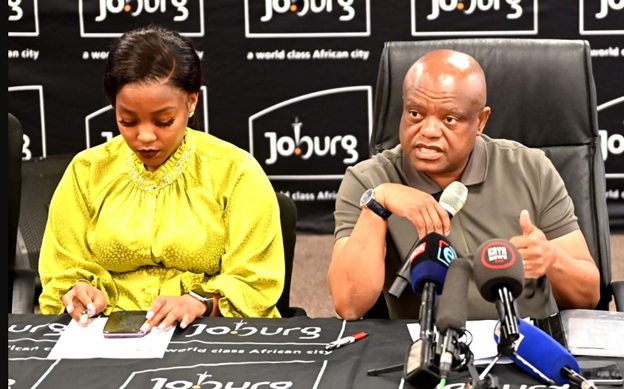By Johnathan Paoli
Joburg mayor Dada Morero has announced the closure of the Metro Centre in Braamfontein because it was inhabitable, unsafe and in violation of the city’s regulations.
The Metro Centre, Johannesburg’s central administrative hub, has been declared unsafe and uninhabitable due to severe infrastructure issues resulting from years of neglect and unresolved structural and compliance concerns flagged in various reports.
“The Metro Centre, located in Braamfontein, has become inhabitable and violates multiple regulations and acts. Therefore, swift action was necessary to prevent exposing CoJ employees and the public to further danger,” Morero told reporters on Wednesday, adding that the refurbishment of the Metro Centre was projected to cost an estimated R3.2 billion.
“We think it will come at about the cost of about R3.2 billion or less but that’s the projected cost of rebuilding of the metro centre.”
According to recent media reports, the decision to vacate the Metro Centre follows a proposed refurbishment plan under a private-public partnership (PPP) led by Bayete Capital.
Valued between R900 million and R2 billion, the PPP was pushed through despite council opposition.
Critics contend that the refurbishment was both unnecessary and exorbitant for a City in financial crisis.
In September 2024, Morero faced public embarrassment when the electricity and water at his private office in Braamfontein, rented from politically-connected businessman and property mogul Lonwabo Sambudla’s Bayete Capital, were shut off due to overdue utility bills.
The incident exposed serious flaws in the City’s property management and sparked concerns about financial priorities in a city facing a R4 billion monthly deficit.
Morero said the building, which was over 50 years old, accommodated around 3,000 employees and offered essential public services daily.
However, its aging electrical, plumbing and ventilation systems have rendered it non-compliant with the Occupational Health and Safety Act and other regulations.
Morero cited a 2014 conditional assessment that highlighted significant maintenance needs and none of which were adequately addressed.
Severe leaks, outdated systems and the inability to issue an Electrical Certificate of Compliance underscored the urgency of action.
In response, the city council resolved in September last year to close the Metro Centre and initiate a refurbishment process.
Morero said the project would be conducted through a public-private partnership in collaboration with National Treasury, with a Transactional Advisor being appointed to guide redevelopment efforts. The aim was to transition from rented private office spaces to modernised city-owned facilities.
This initiative forms part of the city’s broader strategy to ensure safe, compliant and purpose-built office accommodations for its operations.
The executive mayor also addressed ongoing water supply issues, emphasising the city’s commitment to stabilising its reserves, which currently stood at around 40%, below the ideal 60% level, with several interventions having been implemented to manage consumption and improve supply stability.
Key interventions include reservoir outlets being restricted between 8pm and 4am to conserve water, and the response time for burst pipe repairs being halved, from 48 hours to 24 hours.
Additionally, efforts to remove unauthorised water connections in informal settlements and other areas are ongoing; and water supply to high-demand areas and informal settlements is being carefully managed.
The city has also intensified leak detection and maintenance efforts, alongside community education about adhering to Level-1 water restrictions.
These include bans on irrigation during daytime hours, mandatory spray nozzles for hosepipes, and prohibitions on hosing down hard surfaces.
The mayor confirmed that several reservoir systems, including Hursthill-2, Grand Central, and Erand, remain under strain due to high demand and heatwaves, and that in response, the city is employing mobile water tankers to affected areas and adjusting reservoir configurations to balance supply.
The South Hills tower system has faced intermittent supply issues, exacerbated by dependency on bulk suppliers.
He said a permanent solution is underway, including constructing a sump to buffer supply during constraints.
Morero appealed to Johannesburg residents to support the city’s efforts by reducing water demand and adhering to restrictions.
He emphasised that the city was actively implementing measures to repair infrastructure, minimise wastage and stabilise the system.
INSIDE METROS

